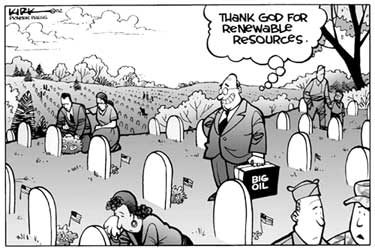![]()
Write us!
[email protected]
July/August 2004 • Vol 4, No. 7 •
Barbara Ehrenreich’s Kinder and Gentler Capitalism
By Bonnie Weinstein
 |
|
Barbara Ehrenreich
|
I remember the argument well. “Women in the military will make for a kinder and gentler approach to war.” This was the philosophy of the conservative wing of the women’s movement in the 1970s. They counterposed these issues to the real issues facing most working women, such as the need for childcare, access to safe and legal abortions and equal pay for equal work.
This conservative wing believed that if women, who were naturally the world’s caregivers, were admitted into the military, the police or even into the corporate structure, it would be the end of an unjust, male-dominated world and its propensity toward violence. They believed that if women could infiltrate the “power structure,” their rights would trickle down—just as profits are supposed to.
That’s why I was so tickled at first to read Barbara Ehrenreich’s1 essay, “What Abu Ghraib Taught Me,” which first appeared May 16, 2004, in the Sunday Opinion section of the Los Angeles Times and then also on AlterNet, May 20, 2004. It’s still posted at http://www.alternet.org/story/18740/
Her essay starts out rejecting this belief—taking issue with this assessment in the context of the vicious acts of torture carried out by American military women at Abu Ghraib. She admits, “Secretly, I hoped that the presence of women would over time change the military, making it more respectful of other people and cultures, more capable of genuine peacekeeping. That’s what I thought, but I don’t think that anymore.”
Ehrenreich correctly dismisses this notion now as simplistic and the result of “a certain kind of feminism…that saw men as the perpetual perpetrators, women as the perpetual victims and male sexual violence against women as the root of all injustice.”
She then correctly points out, “You can’t even argue, in the case of Abu Ghraib, that the problem was that there just weren’t enough women in the military hierarchy to stop the abuses. The prison was directed by a woman, Gen. Janis Karpinski. The top U.S. intelligence officer in Iraq, who also was responsible for reviewing the status of detainees before their release, was Major Gen. Barbara Fast. And the U.S. official ultimately responsible for managing the occupation of Iraq since October was Condoleezza Rice. Like Donald H. Rumsfeld, she ignored repeated reports of abuse and torture until the undeniable photographic evidence emerged.”
Ehrenreich even admits, “The struggles for peace and social justice and against imperialist and racist arrogance cannot…be folded into the struggle for gender equality.” But then she arrives at a somewhat contradictory conclusion: “What we need is a tough new kind of feminism with no illusions. Women do not change institutions simply by assimilating into them, only by consciously deciding to fight for change. We need a feminism that teaches a woman to say no—not just to the date rapist or overly insistent boyfriend but, when necessary, to the military or corporate hierarchy within which she finds herself…In short, we need a kind of feminism that aims not just to assimilate into the institutions that men have created over the centuries, but to infiltrate and subvert them.”
In other words, she still believes that gender inequality is at the root of the problem but replacing men with women is not enough. Instead we must replace these men with “women with a conscience.” These women, she claims, will then be able to subvert the capitalist system into doing the right thing and becoming a kinder and gentler enforcer of capitalist domination—capitalism, so to speak, with a woman’s touch
.
Not only does this imply that there are no men “with a conscience” but it implies that it’s just a matter of replacing “bad boys” with “good girls.” This concept is just as simplistic as the original position she claims to be arguing against.
This kind of thinking is what has invariably led women to commit abuses like those at Abu Ghraib in the first place. And it ignores the real economic hardship young working-class women face that drives them to join the military—very often leaving their own children behind. The same is true for the men who enlist. The capitalists who threaten the very survival of the entire planet do not deserve such sacrifices.
Of course, Ehrenreich’s philosophy also echoes the “lesser evil” theory of electoral politics, which maintains that there are degrees of evil in candidates and we should support the ones less evil. This is the philosophy that has brought us to where we are today—with wars and racial, ethnic and gender discrimination rampant and with antiabortion legislation inching its way back into law.
Even the least evil of candidates cannot make any meaningful changes so long as he or she subscribes to and represents the inherently unequal system of capitalism—the domination of the wealthy minority over the impoverished majority. It is a system that has outlived its usefulness and is destined to crumble.
Just as sending women to fight and die for capitalist imperialism does nothing to raise the status of women or end wars, so will replacing corporate heads with “women or men of conscience” do nothing to reduce capitalism’s overwhelming and compelling need to increase profits above, and at the expense of, all else.
This is the driving force behind all corporate executives, no matter of what race or gender they may be. And if there is no profit to be gained under their leadership, then they are replaced. But have no doubt, the job will be filled and its purpose will remain the same—to make more money by hook or by crook for the company!
It is capitalism and its built-in, all-consuming need for profit, regardless of the needs of people, that enslaves all workers—women and men alike, of all races, ethnic and religious backgrounds—and condemns them to struggle for their very existence.
There is no “trickle down” in money or justice under capitalism. Every bit a worker gets, or will ever get, must be fought for, tooth and nail. Just as every victory won by women or any oppressed section of the working class has to be defended by any means necessary.
Today every victory the world’s working class has won in bloody battle is being challenged and torn asunder by the greed of modern capitalism. We will have to fight to preserve what liberties we have left and to restore those we have lost. These will not be protected or restored out of conscience but out of battle.
1 For those who may not know, Barbara Ehrenreich is also the author of the bestseller, Nickel and Dimed: On (Not) Getting By in America, an exposé of what life is like for those living on minimum wage. It’s a real eye-opener to working-class life in America today and well worth reading.

Write us
[email protected]